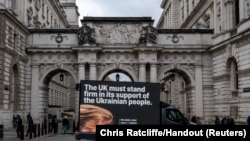As Washington debates the future of the U.S. Agency for International Development or USAID amid reports that it may be put under the control of the State Department, analysts say Britain could offer lessons for America on merging diplomacy and aid.
The Trump administration last month paused funding for USAID, citing a need to align the agency with the president’s America First policy.
British model
In 2020, then-British Prime Minister Boris Johnson merged the Department for International Development (DFID), which oversaw the UK’s foreign aid programs, with the Foreign Office.
“This will unite our aid with our diplomacy and bring them together in our international effort,” Johnson told lawmakers in June 2020.
“The foreign secretary will be empowered to decide which country receives or ceases to receive British aid while delivering a single UK strategy for each country, overseen by the National Security Council, which I chair,” Johnson added.
Johnson’s decision could be traced to his previous role as Britain’s foreign secretary, according to Tim Durrant, program director at the Institute for Government in London.
“I think he'd got frustrated that it felt like DFID, and the UK's aid program and agenda, were separate and not always aligned with what he thought the UK's foreign policy priorities should be,” he told VOA. “I think there was definitely a sense among those on the right of UK politics that DFID was a bit too big for its boots perhaps or needed better oversight."
Aid shock
The move caused shock among many in the aid sector, recalled Mark Miller, a senior advisor at the British-based development research group ODI Global.
“I think the immediate reaction was almost one of confusion. Where does the aid sector go next? What is aid for in this new world where it's being controlled in the Foreign Office? Because you now had a set of senior managers in place who were largely focused on supporting the UK's national interest - however you might interpret that - rather than previously, [which was] a very clear mandate where aid was meant to be prioritised towards poverty reduction,” Miller said, adding that the confusion is “still playing out.”
In 2020, a few months after the merger of DFID with the Foreign Office, Britain’s aid budget was cut from 0.7% of gross national income, the highest in the G7 group of developed nations, to 0.5%.
Geopolitical priorities
Spending was redirected as the government sought to align aid with its political aims. Almost a third of Britain’s aid budget, amounting to some $5.2 billion, was spent on supporting refugees inside the country in 2023.
Aid spending also reflected Britain’s geopolitical priorities, said ODI Global’s Miller.
“There was more attention being paid to trying to out-compete, let's say China or Russia, particularly in Asia-Pacific. Trying to upscale investment in these regions, whereas historically aid had been much more focused on Africa,” he said.
“You've also seen budgets that were traditionally focused on social sectors like health, for example, relatively deprioritized towards some of the sectors associated with the UK’s trade and investment relationships. Particularly energy and climate finance has been a big focus,” Miller added.
UK lessons
The creation of Britain’s Foreign, Commonwealth and Development Office, or FCDO, offers lessons for Washington as it mulls the future of USAID.
“In the UK instance, there was a sort of reputational hit. DFID had a very strong brand, as does USAID,” said analyst Durrant. “There's also the kind of knock-on impact it has on morale and productivity. I think this is particularly going to be the case in the U.S.”
“But there is now a sense that the FCDO is the one voice and that there are people who have both development and diplomacy experience who are representing the UK in countries where the UK is spending development money.”
There are practical as well as political lessons from Britain’s merging of diplomacy and aid, said Miller of ODI Global.
“The loss of expertise and how this rather disruptive merger is going - I think there's lessons about how that could be managed more carefully. I think the second thing we saw in the UK was that closing down a department didn't necessarily forge a new consensus on what aid is for,” Miller said.
With economic pressures impacting government budgets, political debates over the role of foreign aid continue in London and Washington, noted Durrant.
“What you need is strong institutions, you need UK parliamentary and U.S. congressional oversight. You need people to be able to look through what's being spent and how what impact it's having,” he told VOA.












